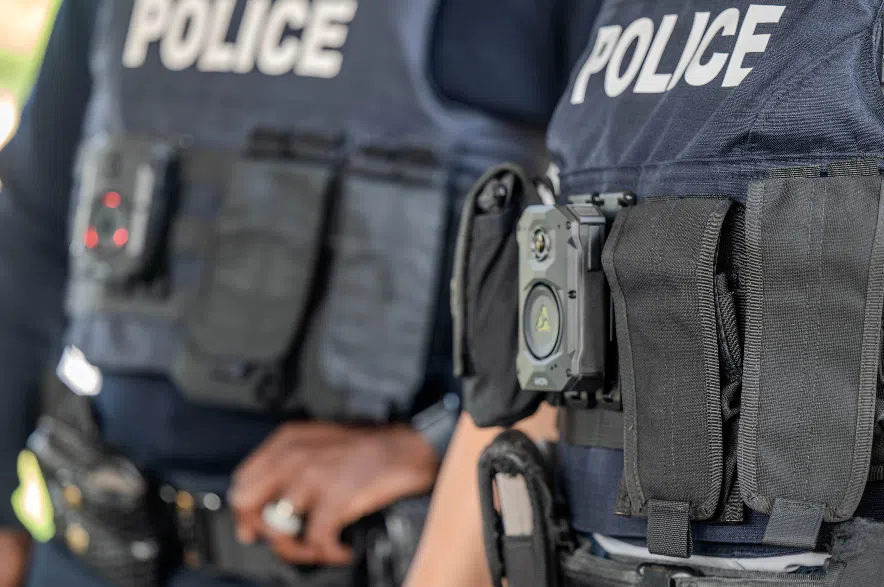From Tuesday, RCMP officers in Fort Qu’Appelle will begin using body-worn cameras, with several other Saskatchewan detachments expected to receive them over the next four weeks.
In a press release on Nov. 18, Saskatchewan RCMP its officers in Black Lake and Fond du Lac would get the cameras starting Nov. 25, officers in Pelican Narrows and Onion Lake would be kitted out from Dec. 9 and Punnichy would get the cameras from Dec. 16, with all remaining detachments getting them over the next 8-12 months.
Read more:
- Man in Fort Qu’Appelle RCMP cells now in hospital in serious condition
- Sask. RCMP warns motorists after five moose-related collisions in half hour span
- Violent crimes on the rise in Saskatchewan: RCMP
Sask. RCMP Superintendent Murray Chamberlin told 980 CJME on Monday he had already received good feedback from Mounties who were eager to strap the cameras on, and the communities selected to receive the equipment first had infrastructure with strong bandwidth to support the cameras.
“We tried to prioritize detachments with a higher workload, but we have lots of those detachments,” he said. “These aren’t the busiest attachments in the province, they’re not the quietest, they would be somewhere in the middle.”
There are over 800 RCMP officers in Saskatchewan, Chamberlin said, and there would be 900 cameras in operation in the province within the next year.
“It’s one more tool, but it’s not going to be fail proof either,” he said. “There are going to be incidents where the camera shows something that a member of the public or our police officer didn’t see.”
The RCMP announced a national roll-out of the cameras last week, and said more than 10,000 cameras would be introduced over the next 12 to 18 months across Canada.
An online survey has been set up by RCMP seeking input from communities with detachments about the cameras. The survey, which takes about 15 minutes to complete is available in English, French and Inuktitut and provides an email address to contact the RCMP with any questions.
Saskatchewan RCMP said in the news release on Monday that the cameras are part of the RCMP’s ongoing efforts to be transparent and accountable to the communities they serve, and video evidence that is collected would provide an independent, unbiased and objective way to capture interactions between the public and police officers.
When will the RCMP’s body cameras be used?
RCMP says on its website the cameras will be worn by front-line uniformed officers who will only activate their cameras while in the lawful execution of their duties, listing examples like:
- mental health calls
- interactions with people in crisis
- crimes in progress
- for investigations
- public disorder and protests and
- to record information to support the performance of their duties.
The RCMP website also says the cameras are not intended to be used for 24-hour recording, surveillance or when intimate searches are conducted.
People will know they are being recorded when the there are three blinking red lights below the lens, RCMP says, and when possible and at the earliest opportunity, officers will inform people as well, noting that there may be times where an officer is unable to do this.
A digital evidence management system has been set up to to store and manage body-worn video, and RCMP says videos will be stored for time periods ranging from 30 days to 2 years or longer.
“Generally, the more serious the incident or crime, the longer the video is kept,” RCMP says on its website.
Each camera can store around 60 hours of audio and video and have an estimated battery life of at least 13 hours.
The RCMP has not purchased the equipment but is using a software subscription model which requires only minor IT development work by the RCMP.
“As we continue to modernize as Saskatchewan’s provincial police service, body-worn cameras will have a role in our ongoing trust-building with the communities and people we serve,” Assistant Commissioner Rhonda Blackmore, Commanding Officer of the Saskatchewan RCMP said in Monday’s release.
— with files from Gillian Massie
Read more:
- Man in Fort Qu’Appelle RCMP cells now in hospital in serious condition
- Sask. RCMP warns motorists after five moose-related collisions in half hour span
- Violent crimes on the rise in Saskatchewan: RCMP











